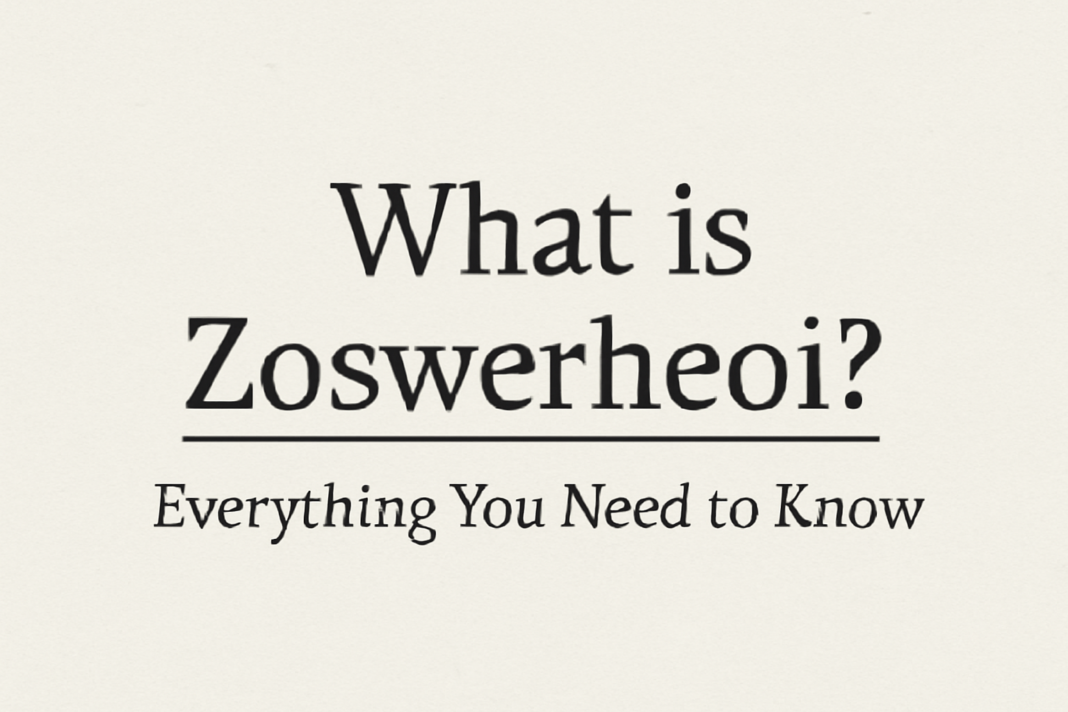If you’ve come across the term Zoswerheoi and found yourself scratching your head, you’re not alone. It’s a strange and unfamiliar word, and you might be wondering what it means and if it’s something you can use in your daily conversations. In this blog post, we’ll explore the mystery of Zoswerheoi, unpack what it really stands for, and help you understand how it fits into different contexts. By the end, you’ll have all the details you need, including whether it’s something you should start using or just forget about!
What Exactly is Zoswerheoi?
Before diving into how and when to use Zoswerheoi, let’s break it down. Zoswerheoi isn’t a commonly recognized word or acronym. In fact, it doesn’t seem to belong to any established category of terms. This could mean it’s a new term, a slang word from a niche group, or simply a made-up phrase that gained some traction online. The key to understanding any new term is to figure out its context—who’s using it, where it’s being used, and why it’s relevant.
However, without any widely available definition, Zoswerheoi remains somewhat elusive. It might even be a blend of letters that resembles a foreign term or a cryptic symbol, sparking curiosity due to its oddness. At this point, it’s fair to say that Zoswerheoi is a mystery wrapped in a riddle.
How Did Zoswerheoi Gain Popularity?
Even though Zoswerheoi is not widely recognized or defined, it’s not uncommon for strange terms to appear and go viral on the internet. Sometimes, acronyms, slang, or random phrases are created in memes, social media posts, or niche online communities. These terms can gain popularity and spread quickly if they resonate with a certain group of people or serve a particular purpose.
For instance, terms like YOLO or lit started as niche terms before becoming mainstream. It’s possible that Zoswerheoi might have followed a similar path. However, its exact origins remain unclear, so it could be just one of those words that pop up unexpectedly in a specific context and capture attention.
Can I Use Zoswerheoi in My Daily Conversations?
This brings us to the burning question: Should you start using Zoswerheoi in your everyday conversations? Well, that depends on several factors:
Know Your Audience
As with any new term or phrase, the first thing to consider is whether your audience will understand it. If Zoswerheoi is still a niche or obscure term, using it in regular conversations might leave people puzzled. Communication is all about making sure your message is understood, so unless you’re speaking with a group familiar with Zoswerheoi, it’s probably not the best idea to use it just yet.
If you’re among friends who are into meme culture or online slang, using Zoswerheoi might actually make you seem “in the know.” Just make sure you’re not overusing it to the point where it becomes confusing.
Stay Authentic
Another important point to consider is whether Zoswerheoi adds any real value to your conversation. Sometimes, the use of trendy words or acronyms can feel forced, especially if they’re used without a clear purpose. Be sure to use terms like Zoswerheoi when they fit naturally into the conversation. The more authentic you are in your speech or writing, the more your audience will appreciate it.
Is Zoswerheoi Worth Using?
At the end of the day, the question remains: Is Zoswerheoi worth incorporating into your vocabulary? Since it’s not widely recognized, it’s essential to understand that using the term too much might make you seem out of touch or like you’re trying too hard. While it might be fun to experiment with a new word, overuse could result in confusion.
However, if you come across Zoswerheoi in an online community or setting where people are already familiar with it, it could serve as a useful shorthand or inside joke. Just make sure you’re not relying on it as your go-to expression in every conversation. Like all trends, it’s best to use it when it makes sense.
Alternative Ways to Express Yourself
If you’re looking for more universally understood ways to express yourself or convey similar ideas, there are plenty of other options. If Zoswerheoi was meant to convey excitement or surprise, for example, you could use words like “awesome” or “amazing.” If it’s a more philosophical term, terms like “mindful” or “present” may be more appropriate and easily understood by most people.
Sometimes, the best way to communicate is to stick with simple, clear language that resonates with a wider audience. Trends come and go, but clarity always wins.
Conclusion
In conclusion, Zoswerheoi is a term that’s still in its early stages of recognition—if it ever becomes truly established at all. While it may be fun to experiment with new terms and trends, it’s essential to think about context and clarity when deciding to use a term like Zoswerheoi in your day-to-day life. If you’re unsure, consider sticking to more familiar words that will make your message clear and engaging for everyone you speak with.
Until Zoswerheoi becomes more widely recognized (if it ever does), it might be best to keep it in your back pocket for niche conversations. The world of language is always evolving, and sometimes, you just need to roll with the punches and adapt to what’s relevant.



